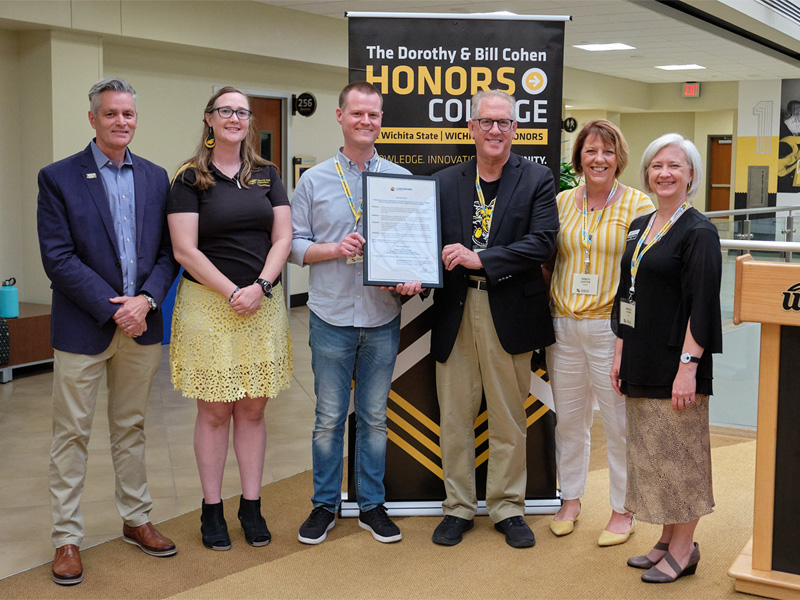I am the Director of the Environmental Finance Center at Wichita State University. The work we do for communities is important and valuable; however, if I didn’t show up and do my job for a few days in a row, only a handful of my coworkers would be negatively impacted. My absence would not cause ripples through the community negatively impacting schools, households, hospitals, businesses, industries, veterinary clinics and on and on. But, if our community water and wastewater operators decided to stop showing up for work, there would be some pretty big ripples that would disrupt all aspects of our community for days and possibly weeks!
In today’s utility workforce, there are large numbers of retirements and job transitions that leave more open jobs than there are job seekers. These vacancies have the potential to risk the safety and reliability of our most important daily requirement – water. Therefore, we need to do all that we can to build our future water workforce.
Current high school students and veterans are two groups that, with a little investment of time and effort for outreach and recruitment, could help us fill our water workforce vacancies and create a pipeline of talent that benefit the water service in our communities for years to come.
High School Students
Want to find the next generation of your utility’s workforce? Look no further than your local high school. Or the high school in the next town over. Today’s young people are looking for jobs that are meaningful and provide good-paying, stable employment with the opportunity to advance and continually learn new things. If that doesn’t describe the water industry, I don’t know what does.
Reach out to your high school’s career counselor to connect with students who have the right skills and attitude to be a public servant for the community. Counselors can direct you to students that might be good fits for internships or summer staff. You can use these temporary positions to get to know young people and see how they fit in your utility. Maybe some students are ready to transition from high school straight into a career in water.
You can also start your own water utility outreach program where you show high school students what water utility jobs are like and how they can develop a life-long career in the industry. An outreach program can provide your utility with the opportunity to get young people interested in a career in water. Check out all the great, free resources that can help you connect to local high school students at www.wichita.edu/workinwater. Don’t hesitate to contact us to help you start your own program.
Veterans
U.S. veterans are a highly skilled and motivated, but often underutilized, pool of candidates. Veterans often have technical and leadership skills that they can bring into the civilian workforce. Individuals that have served in the military are able to perform under pressure, are comfortable with nontraditional work schedules and environments, and can provide unique insight into the operations of a utility. Veterans also respect procedures and regulations, problem solve, are good team members and have a community mindset. All these traits align with the attributes of our water utility workforce. There is a strong business case for hiring veterans. A study by Syracuse University shows that the “strong sense of mission that comes from military service are characteristics that are highly valued.”
Use the U.S. Department of Labor’s (DOL) Career One Stop to easily connect with veterans who are job searching in your area. Learn more about hiring a veteran with the DOL’s Employer Guide to Hiring Veterans.
The American Water Works Association has resources for recruiting, hiring and retaining veterans.
With all the demands on the technical and regulatory tasks at your water/wastewater utility, developing and implementing an outreach and recruitment plan can easily get pushed to the bottom of the list. However, there are dollars and time lost during the hiring process when there are long job vacancies. Additionally, those losses are compounded when an employee is hired that isn’t a good fit for the position.
Take the time to do Outreach
Share with the community and potential employees about the job of a water and wastewater operator. What are the duties, expectations, and highs and lows of the job? Talk about how meaningful the work is and about specific times when you were able to solve a problem to benefit the community. This will help increase appreciation and awareness of the water/wastewater utility service in the community. It will also help avoid false expectations of the job for potential job seekers, while allowing others to identify how they might enjoy the job.
Take time to strategically Recruit
Be where your next great employee might be today. It might be the local high school, on a veteran job board, a community college job fair, community event, social media, etc. Train everyone at your utility, from board members to managers to clerks to technical staff, to talk about how their jobs positively impact the community, where potential job openings may occur next, the skills and abilities of the next potential staff member, and how folks can apply for careers with your utility. Word of mouth is where most people find their jobs.
Investing time and energy into outreach and recruitment pays off when filling vacancies with great employees is quick and seamless. Take the time today and avoid ripples of disruption tomorrow.
Are you interested in a mini-grant to do the Work in Water Intern and Educational program this year? If so, contact Jeff Severin, jeffery.severin@wichita.edu, today! Kansas, Nebraska, Iowa and Missouri communities only, at this time.






